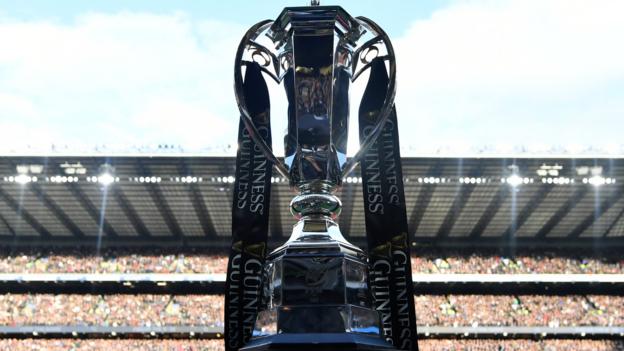
Six Nations organisers said they "would not rule anything out" after reports the tournament would no longer be on free-to-air television from 2022.
The television rights are currently shared between the BBC and ITV, but a joint bid would not be allowed when the deal ends in 2021.
The Rugby Paper reported on Saturday that the championship will go behind a paywall on Sky.
But a Six Nations statement said any speculation was "highly premature".
"Six Nations are in the process of seeking bids for various sets of media rights but these are not due for some time," the statement read.
"All of this is highly premature and speculative as no proposals have yet been received by any interested party.
"We would not rule anything out at this stage and the unions will collectively review and make a decision based on the nature of the offers received."
England's home games were on Sky from 1997 to 2000, but Six Nations games have been free-to-air since then.
A BBC spokesperson said: "While we wouldn't comment on the specifics of an ongoing rights negotiation, terrestrial channels have brought unprecedented viewing figures to the Six Nations, ensuring that rugby remains a sport that is very much relevant and enjoyed by as wide an audience as possible and we very much hope that will continue."
In February, the Guardian reported that the deal to sell a stake of the tournament to private equity firm CVC is being held up by the home unions' desire to keep the Six Nations on terrestrial television.
Leader of Plaid Cymru Adam Price has written to the Secretary of State for Digital, Culture, Media and Sport (DCMS) Oliver Dowden asking for the tournament to be protected on terrestrial television on the grounds that it is an "integral part of Welsh culture and identity".
Under the Broadcasting Act 1996, a series of "Group A" sporting events were listed which must stay on free-to-air television. These include the FA Cup final, the Grand National and the Olympic Games.
A DCMS spokesperson said: "Our listed events regime strikes a balance between retaining free-to-air sports events for the public while allowing rights holders to negotiate agreements in the best interests of their sport. Negotiations on television rights are a matter for the sports authorities and broadcasters."
Analysis
Huw Thomas, BBC Wales arts and media correspondent
When broadcasters were recently invited to bid for the rights to show the Six Nations, the tender document took the BBC and ITV by surprise.
It appeared to rule out a joint bid, the format which had previously allowed the two broadcasters to pool their funds in order to keep the competition on free-to-air TV.
I understand the BBC and ITV are still likely to attempt to strike a joint deal this time, regardless of the initial impression that it would break the rules.
But the rugby unions are said to be keen to increase the value of the deal, and will be hoping for significantly more than the approximately £65m per annum that the Six Nations TV deal secured last time.
If a pay TV channel is prepared to spend much more on the rights, it may suit the unions to take the cash.
But a significant price would be paid in the form of the TV audience, which would fall dramatically for any game played behind a paywall.















 Phone: (800) 737. 6040
Phone: (800) 737. 6040 Fax: (800) 825 5558
Fax: (800) 825 5558 Website:
Website:  Email:
Email: 






